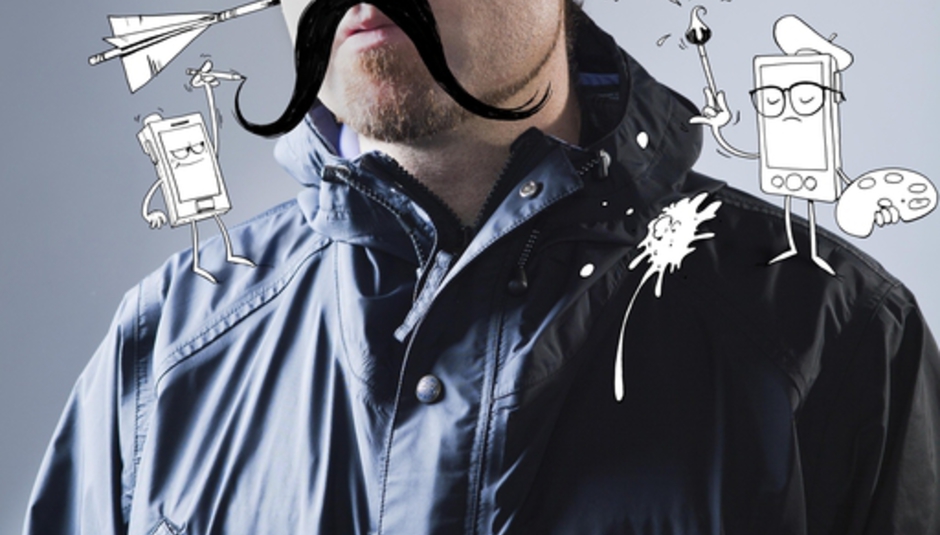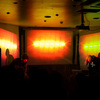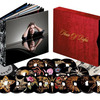Why not listen to Shadow’s Soundcloud while reading this interview? It’s got nuff dope remixes, and some samplers from the forthcoming album, The Less You Know The Better
[Spoiler: this interview will not mention the size of Shadow’s record collection at all. Not even once. It’s what he does with it that counts.]
It’s hard to know what to expect when you meet DJ Shadow. I mean, I had to Wikipedia his real name; always an awkward introduction when an artist is better known by their stage-name – particularly when that’s prefixed with the letters D and J – and not what their mom used to call them in to dinner with. Joshua Davis has deliberately draped himself behind not only an alias but also a mask of hip-hop vigilante anonymity so intricate it extends to every aspect of what he creates (even sprinkled through his music in samples: “The moon rises on Funky City. Wait a minute, out of the darkness a tall figure appears. Who is he? There’s a mischief to it, and everyone loves a mischief maker, but what of the man behind the mask? The man behind the music?"
The Less You Know The Better lands in September and I Gotta Rokk, an EP of remixed tracks from that album, has been kicking around since May. And enquiring minds want to know: I’m the penultimate slot on the 5th floor at Island Records, and he’s had journos herded in front of him, mooing like cattle, all day long. But he’s sharp, thoughtful and polite; there’s an underlying strength to his music, and there seems to be much of that about the man as well. Like meeting a priest or a doctor, he has the aura of seriousness that surrounds someone who believes in something – who’s dedicated their life to something. He may have been away a while, but for Shadow, it seems, this is still all-consuming.
And, apparently, it always will be: he talks not of the next album, not even of the next five years, but of a 30 – 40 year plan: “I’ve just always been inspired by people like, for example, Neil Young. I wasn’t fully aware of his entire history going back to the early sixties, but I was aware of him as a long term artist. As I have continued in the industry and have continued to make things, continued to explore music, I have more and more respect for him – for people like Johnny Cash, people who manage to stay true to their vision for that length of time. You really don’t get the impression that someone like a Neil Young has just retired to an easy chair and said, ‘well, I’ll just bang out the hits.’ I think he still feels like there’s artistic statements yet to be made, and I just find that very inspiring.”
Telling that he cites two guitar artists as inspiration: the turntablist sees himself as disc jockey first and foremost and then producer, but more broadly as musician. And suffers the same anxieties as such: “I find that right before a tour I get very concerned that I might cut the wrong finger or something. Which I’m sure happens to guitarists and piano players as well.” It’s the paranoia of a perfectionist, perfecting his art. Talking of his recent performance at Glastonbury, he shuffles in his seat, glances down at his sneaks and says: “Yeah, it went well, it was one of the better festivals I’ve played, and I felt good, technically, about what I put forth. Because I’m pretty hard on myself in terms of if I miss cues or whatever, y’know? I mean, it comes down to even, like, if I have to hold my suitcase too long in a funny position, I feel it when I’m trying to scratch later, y’know what I mean? And I don’t feel…there’s a certain something I’m trying to do and it’s not happening – it can be quite frustrating.”
He’ll go on to mention what he ‘puts forth’ twice more in the next twenty minutes. Where modern hip hop is littered with bling-toting yahoos so full of pride that you can’t help but wish for their fall, Joshua displays an infinitely preferable pride in his work. It’s part of this perfectionism that runs to every last detail, and as a musician and performing artist, he is meticulous: “When people come to see me they expect to hear my music. So, it’s my job to put together a set of music and a visual show that satisfies not only the hardcore fan but also the neophyte; will satisfy not only a festival crowd but a club crowd; will satisfy a rock crowd, a hip-hop crowd, a dance crowd. It can be very stressful putting that together.”
But although he definitely doesn’t want to disappoint, it’s not that he lacks confidence. And his main source of confidence comes from the well that is his deep-seated love of music: like a musical kung-fu master, the more he respects his art, the more ass he can kick. He knows that if he treats it right, it will do right by him in return. When he talks of his set at Glastonbury, on that certain special stage, it’s obvious that he draws strength from this thing that he’s involved in: “Because of the context of it being John Peel, I really didn’t feel any level of stress or anxiety, and there was also no pomp, no ego. I mean, it’s just John Peel; you just do it. It’s not a stressful thing, it’s just paying respects.”
He shows deference to the whole music scene and all its history, but there is, obviously, one genre that is special to him: hip-hop. People talk of his forays into electro, the recent EP has moments of seriously silky soul and big riff rock, but at the heart of it all is hip-hop: “In the same way that gospel is at the root of what so many blues artists did, and blues is at the heart of what so many rock artists did, hip hop is at the root of everything I do, regardless of what it sounds like. That’s my life music, it always will be”.
It’s not just his life music, it’s his life: "The Message came on the air one day, and that was it. And you never look back do you?” He talks of the influence of Mrs. Davis in his musical development, and his mild teenage rebellion to her insistence on piano lessons. But he’s grateful that someone at least had the opinion that he had an ear for music: “In a way, I think, it was just enough to, y’know, kind of crack the door open, and when I discovered hip-hop I threw myself in. Hip hop was something that she or anybody else could never have predicted – it was just a meant to be type thing.”
As a long-term recording artist himself, he’s seen a lot of things happen, to the industry in general, and to hip-hop in particular: “I do think hip-hop has suffered the brain drain effect to a greater degree than other styles of music, because less and less people have figured out a way to make it financially worth their time. So, if less people are competing and less people are rapping, it’s not going to move. I think these are the sorts of subjects that need to be addressed in the era that we live in.” Like a canny school teacher, the sly scolding parent, it’s the disappointment of someone with a vested interest, a disappointment that is always so much more potent than raw anger: “I don’t care about other thing, I care about music. The subject I’m passionate about us music, and I don’t like to see it doing badly. I think we all need to figure it out.”
And Shadow does definitely seem disappointed with where hip-hop – his hip-hop, his first love – has been taken by unscrupulous money men and get-rich-quick-artists. When he called an interlude on Entroducing 'Why Hip Hop Sucks in 1996' (“it’s the money, money, money…”) all hip-hop heads sort of nodded, pulled up their hoods and muttered, ‘true, true.’ These days, sucking is hip-hop’s perennial problem, but this was an entreaty; Shadow offers an alternative: “I think the last time hip-hop didn’t suck in my life would have been in the hyphy era, because it was something that was extremely potent.
It was like civic pride, it was the equivalent of the Giants winning the world series or something. Imagine if you lived in Leamington Spa and that was the hotbed of a style of music that didn’t exist anywhere else on the planet and to your ears it was the most exciting music on the face of the planet at that time: whadda ya do? Just stand by and go, ‘ah, that’s cool’? No, you get involved, you support it and you want to contribute in a meaningful way.”
And, of course, he’s made quite the contribution. It’s hard to imagine what hip-hop would look like without him – he’s the vanguard, the granddaddy. Not quite the loner, The Outside, he would have us believe though: collaboration has been a big part of his career (from the very start with Solesides, Blackalicious and Lyrics Born, to James Lavelle, Roots Manuva and Thom Yorke). But, no matter big or small, always with those he respects; it’s his scene and he’ll work it the way he wants: “I take very seriously my role as producer, although it’s safe to say I’ve never been the type of producer that’s sort of the hot kid of the minute, y’know what I mean? The go-to remix guy? Because I’ve never been able to make club hits or radio hits or anything of that ilk. I produce my stuff, I produce the stuff of peers and friends, but I suppose I’ve never taken that seriously an attempt to foray into producer superstardom.”
When he says he’s ‘never been able to’, he’s not referring to a lack of technical ability, but that something in his psyche out-and-out refuse to – refuses to betray his ideals: “I grew up in a household that was very cynical of anything that reeked of get-rich-quick. As a result I never like pop, and I never like, even as a youth, the stuff I was supposed to like.” The Shadow is not for selling out.
But for the successful modern musician, for the hip-hopper especially, temptation is never far away. Big Business has its way of getting to everyone – loads and loads of filthy lucre, usually. So the persona is a way of protecting himself, protecting his music. That’s why it feels odd calling him by his real name: it’s like breaking the magic of Father Christmas, the magic of the myth. The myth is important. He makes a satire of himself because he, DJ Shadow, Joshua Davis, is not the point: the music is, and it matters much more than any ego. Shadow makes his statements, tells his stories, through his samples: “You can have your poppin’ pills if that’s your mode, but I get my high from smokin’ soul. I get up with it, down with it, love it and can’t quit it.”
Click on the 'About Shadow' section of his website and before you even get a chance to glean anything about where he was born, who his partner is, or anything at all about his history, a whistling cartoon mobile phone pushes a lawn mower through the words, rendering them unreadable. An irreverent laptop partially hides his discography by throwing old albums into a dumpster. This is typical, not only in terms of hiding himself away, but also in the humour employed to do so: “I suppose, that what I arrived at, that felt relevant to me, was simply using myself as a subject of satire, and what it’s like to be a recording artist in 2011, which was ‘yep, I know nobody gives a shit, ok, no problem’ – like, let’s have fun with it.”
That’s why the title of the new record – The Less You Know The Better – is deliberately vague, obtusely so, even: it says nothing, and that says it all. The less you know about Josh Davis, the better. The more room is allowed for audio appreciation:
“The music is the music, but unfortunately in 2011, to many people, music in itself is not newsworthy. So, it’s beholden for artists like myself to come up with an innovative way to market ourselves, and I’m well aware that the only difference between this album and last, in terms of my public face, so to speak, it that I’m a little bit older, I’ve got a bit more grey hair, I still love music to the same extent. But that, to a lot of news outlets, that in itself is not newsworthy. Discussing music may have been interesting enough at one point but nowadays you have to wear a meatdress or slag of your peers or, y’know, leak your sex tape or whatever it is that draws eyes to you and says, ‘hey, I have an album coming out’.”
Unusually enough when someone does have a new album out, we didn’t talk about his last, The Outsider - it felt almost rude to bring it up. Fair to say that it wasn’t met with the ticker-tape parade usually reserved for a Shadow production. Everyone seems to be talking about the new album ‘landing’ in September, which is partially PR prattle, but perhaps also reflects the fact that Shadow fans have been in a holding pattern for the last five years, awaiting word from the tower:
“I don’t know how long it’s supposed to take someone like me to put together an album, but my methodology is pretty exacting and it’s pretty time consuming. And it’s not like I can just sit down and go, ‘I have an arrangement problem here’. I’m in some ways bound by the material, and by the palette wheel that fate gives me – what record I select at what time. There’s a song on the record, for example, that I started in 2005 and I finally was able to finish this year. It just happens that way. 'Six Days' was 2002, on The Private Press, but that song started in ’94, prior to Entroducing.”
In 2011, the process, the production (whether that’s in a studio or on a stage) remains all-important. The perfectionist’s dedication and discipline that means, however The Less You Know, goes down, you know he’s certainly not retired to an easy chair to bang out the hits: “You’ve got to speak to everybody, in a way. And not compromise who you are and what you do. I always am amazed, time after time, when it comes together. I mean, it doesn’t always come together immediately, I continually tweak, but it’s in a good place right now.”
Tweaked to perfection, if the I Gotta Rokk EP is anything to go by – and it is, that’s the point – September can’t come soon enough for Shadow fans. The Less You Know is likely to be a positive, almost cleansing, influence on all who hear it. Shadow still aims to touch souls with his samples, to move with his music, and in an industry that’s gone Gaga, in the age of X-Factor flippancy, it’s comforting to know that someone still cares. As a music fan, whether you’re a hip-hopper or not, it’s refreshing to be treated with respect:
“Me using satire in the way that I’m using it, hopefully there’s an element of truth that resonates with people. And maybe a few people kinda go, ‘yeah, it has gotten a bit silly’. All the add-ons and the free this and the free that – how are people supposed to care? And I do care about music…”
The new single, ‘I’m Excited’, is out on 1 August. The Less You Know the Better is released on Monday 5th September.






















